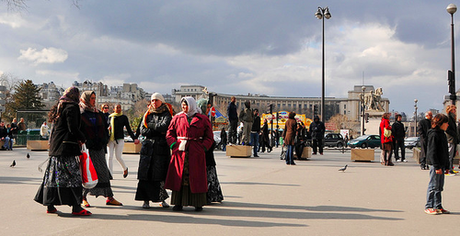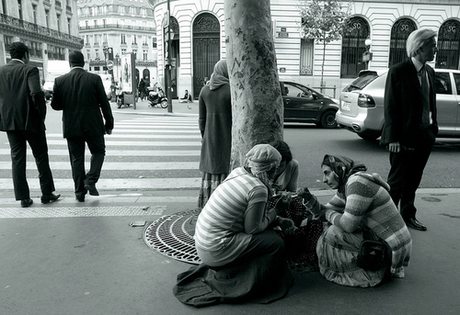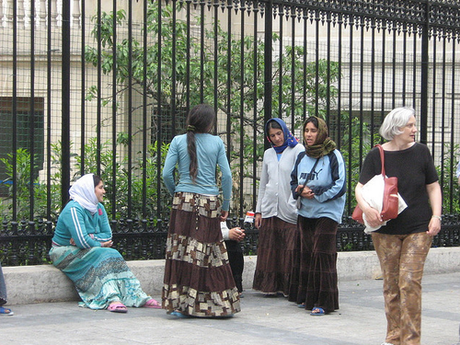
Like most Americans, I arrived in Europe with no prejudice I was aware of against gypsies. They do figure in a lot of songs and ballads, but usually in a swashbuckling, Johnny Depp kind of way:
"What care I for my goose feather bed wi' blankets strewn so comely, oh?
Tonight I lie in a wide open field in the arms of a raggle taggle gypsy, oh.""How could you leave your house and your land? how could you leave your money, oh?
How could you leave your only wedded Lord for the arms of a raggle taggle gypsy-o?"
My first encounter with a gypsy child was in Germany, where a handsome little boy with black hair and dark eyes came up and gestured to me, saying, "Milch, milch!" As it happened, I had just been to the grocery store. I fished out a carton of milk and handed it to him. He stood there looking puzzled and annoyed, then threw it to the ground and walked off.
I learned that the term "gypsies" could be offensive and that they were an ethnic group called (currently) Rom/Roma/Romani, although they actually consist of many different groups, only one of which is actually Rom. They originally came from India during the middle ages, no one knows why, and since Europeans did not know the world well, in those days they were called "Egyptians" or "gypsies." Because they traveled constantly, did not intermarry much (well, the ones who did have been absorbed into the rest of the population; I met some in Germany who revealed their heritage to me only because I was a foreigner), still observe Hindu caste regulations and customs including child marriage, and speak their own language, they met with hostility wherever they went. Hitler tried to wipe them out, and wherever Romani populations were under the Nazis, they were exterminated as mercilessly as the Jews were.

For historical reasons, the largest number of Romani are from Romania, which is now in the European Union. Although probably no one is as prejudiced against Romani as Romanians are, the Romani are now allowed, as EU citizens, to circulate freely in Europe. This does not mean other nations want them.
Since the beginning of the summer of 2011, there has been a crime wave in Paris caused, according to the police, by large numbers of young "Romanians" who are controlled by invisible adults. The French laws for juvenile offenders are very lenient and although the young people may be caught over and over again for pickpocketing (their main crime), they are out on the streets again within hours. Many of the kids have quotas to fulfill and are very skilled at extracting phones, wallets and cash from unsuspecting tourists who stop for their "Do you speak English?" or "Have you lost a ring?" or "I am deaf" scams while someone behind them is swiping their stuff.

The children and their parents live in miserable conditions in temporary encampments near unwilling communities. Periodically, EU governments try to improve things, force the children to go to school, or alternatively toss them out of the country. The Romanians, who have sent 40 policemen to help the Paris police deal with them, don't want them back.
The latest arm in the French battle is a ban on begging on the Champs-Élysées, around the Louvre and Tuileries, and around the great department store zone of Galeries Lafayette and Printemps. "La quasi-totalité [est] de nationalité roumain*," a police spokesman said. So far in 2011, 10,000 "Romanians" have been arrested in Paris alone.
*"Almost all" beggars given a fine on the Champs-Élysées were "of Romanian nationality".

